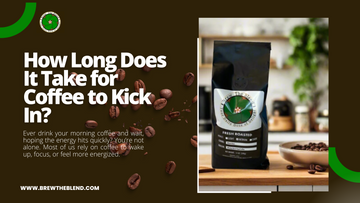Do More People Drink Coffee or Tea Worldwide?

Coffee or tea? It’s the timeless beverage debate brewing in cups around the world. From busy European cafés to peaceful Asian tea gardens, people everywhere have their daily routines. Some can't start the day without the strong kick of espresso, while others find comfort in the calming swirl of green tea.
But when it comes to the numbers, which drink takes the crown? Let’s review the global stats and find out whether coffee or tea is the top choice for the world’s favorite beverage.
Global Popularity: Coffee vs Tea by the Numbers
So, do more people drink coffee or tea worldwide? Tea claims the global title, but not without strong competition from coffee. Tea has deep cultural roots in countries such as China, India, and Japan, where it has been used for thousands of years. In contrast, coffee, although younger in global history, dominates consumption in Western countries and Latin America.
According to data from the United Nations Food and Agriculture Organization, tea is the second most consumed beverage in the world after water. That means billions of people drink it every day, whether during meals, ceremonies, or simply for its comforting effects.
Coffee, however, is gaining momentum, especially in urban environments. Its cultural appeal, versatility, and caffeinated kick have made it a staple in homes and offices from New York to São Paulo to Sydney.
In short, while more people drink tea globally, coffee wins big in terms of per capita consumption in many regions.
Tea vs Coffee Map: Who Drinks What?

Let’s take a visual tour of global preferences with a tea vs coffee map.
This kind of geographic breakdown helps paint a clearer picture. In Asia, tea is nearly sacred. In China, green tea is not just a beverage; it’s a cultural practice. India has its beloved masala chai, which is sold on every street corner. Japan reveres matcha in ceremonial settings.
Meanwhile, Europe leans more toward coffee. Nordic countries, such as Finland and Sweden, are particularly fond of it, and Italy’s espresso culture is renowned worldwide. Germany and France, too, enjoy their café culture, often pairing coffee with breakfast pastries.
In the Middle East, both beverages hold significant cultural significance. Turkish coffee is thick, strong, and legendary. However, Turkish tea, served in tulip-shaped glasses, may be more prevalent.
Also Read: Can You Drink Coffee While Fasting
Let’s compare some numbers in a simplified coffee vs tea chart:
|
Country |
Preferred Beverage |
Average Yearly Consumption |
|
Finland |
Coffee |
12 kg per person |
|
Turkey |
Tea |
3.16 kg per person |
|
USA |
Coffee |
4.4 kg per person |
|
UK |
Tea |
1.9 kg per person |
|
China |
Tea |
1.2 kg per person |
|
Brazil |
Coffee |
6.0 kg per person |
Examining the tea chart and coffee chart side by side, it's clear that beverage preferences are deeply cultural, with tea leading in total volume, but coffee remains strong in certain regions.
What Percent of People Drink Coffee?
Approximately 30–35% of the global population drinks coffee regularly. This amounts to about 2.25 billion people, a significant portion of the world's population. In some nations, such as the United States, the figure is even higher. An impressive 64% of U.S. adults say they drink at least one cup of coffee every day.
Coffee is often linked to work culture, academic settings, and social gatherings. It’s common to hear someone say, “Let’s grab a coffee,” whether you're doing business or catching up with a friend.
Tea, by contrast, has about 40–45% global participation, mainly due to its strong presence in Asia, where populations are large. China and India alone have over 2.7 billion people, and tea is a daily staple in both.
So, do more people drink coffee or tea worldwide? When it comes to percentages, tea edges out, but coffee isn’t far behind, and in some markets, it’s gaining ground.
Why Coffee Is Better Than Tea (According to Coffee Lovers)
Let’s shake things up a bit: why coffee is better than tea, at least from the perspective of coffee enthusiasts?
Here’s the rundown:
-
Flavor Complexity: From dark roasts with chocolate undertones to fruity Ethiopian beans, coffee provides a wide range of flavors.
-
Cultural Versatility: Lattes, cappuccinos, cold brews, espressos, mochas—you name it. Coffee fits every style and season.
-
Productivity Association: Coffee is the unofficial beverage of workspaces, brainstorming sessions, and entrepreneurs.
Coffee or Tea: Which Has More Caffeine?
The battle of the buzz: which has more caffeine, coffee or tea?
Here’s a thorough comparison to settle it once and for all
|
Beverage Type |
Avg. Caffeine (8 oz) |
|
Brewed Coffee |
95 mg |
|
Espresso (1 oz) |
63 mg |
|
Black Tea |
47 mg |
|
Green Tea |
28 mg |
|
Chai Latte |
40–50 mg |
|
Herbal Tea |
0 mg (usually) |
Coffee contains more caffeine. That’s why it’s the go-to when you need to pull an all-nighter or recover from one.
But tea lovers aren’t left behind. While tea delivers a smaller caffeine dose, it often pairs it with L-theanine, which promotes calm focus and reduces jitters.
Is Tea or Coffee Better for Your Health?

Let’s consider the advantages.
Coffee Benefits:
-
High in antioxidants like chlorogenic acid
-
Can boost memory and alertness
-
May lower the risk of Parkinson’s, Alzheimer’s, and certain cancers
-
Enhances metabolic rate and fat burning
Tea Benefits:
-
Contains polyphenols and catechins (especially green tea)
-
Reduces inflammation and supports heart health
-
Promotes relaxation and digestion
-
Lower caffeine, which can reduce anxiety or heart palpitations
So, is coffee or tea better for you? The answer depends on your personal health goals. Want a boost in metabolism and sharper focus? Opt for coffee. Do you need to relax, hydrate, or soothe digestion? Tea could be your best choice.
The smart choice? Enjoy both in harmony. Discover calming wellness blends from our premium tea collection for your more relaxed moments.
Final Thoughts
While tea may lead the global market in overall consumption, coffee continues to dominate in many regions because of its energizing appeal and rich cultural heritage. From tradition to trend, both drinks have established their place in daily routines around the world. In the end, the winner isn't just what's most popular, but what makes your day better.
Ready to enjoy your favorite drink? Whether it’s a bold coffee or a soothing tea infusion, Brew the Blend has something for everyone. Shop now to find your perfect cup.
FAQs
Q: Which has more caffeine, coffee or tea?
Coffee has more caffeine than tea. An average cup of coffee contains about twice as much caffeine as black tea and significantly more than green or herbal teas.
Q: Do more people drink coffee or tea worldwide?
Globally, more people drink tea. It’s especially popular in Asia and parts of Africa, making it the second most consumed beverage after water.
Q: Is coffee or tea healthier for you?
Both offer health benefits. Coffee increases energy and boosts metabolism, while tea promotes relaxation and supports heart health. It depends on what you need.
Q: Which is more harmful, tea or coffee?
Neither is harmful when consumed in moderation. Drinking too much coffee can lead to jitters, while excessive tea consumption may interfere with iron absorption. For most people, both are safe.
Q: What percentage of the world population drinks coffee?
Approximately 30-35% of the global population drinks coffee regularly.
Q: Is tea the most popular beverage worldwide?
Yes, after water, tea is the most popular beverage in the world.
Also Read More Related Blogs:





